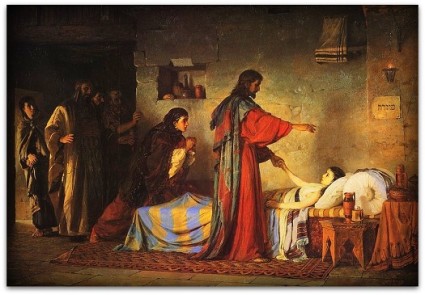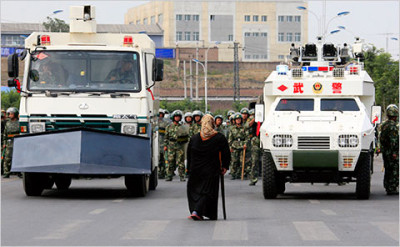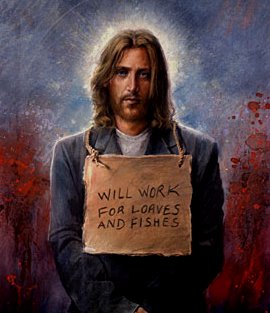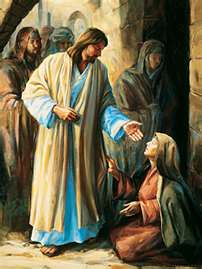
-30-06-2021-
Thirteenth Sunday in Ordinary Time
Gospel text: Mark 5:21-43
vs.21 When Jesus had crossed again in the boat to the other side, a large crowd gathered round him and he stayed by the lakeside.
vs.22 Then one of the synagogue officials came up, Jairus by name, and seeing him, fell at his feet
vs.23 and pleaded with him earnestly, saying, “My little daughter is desperately sick. Do come and lay your hands on her and make her better and save her life.”
vs.24 Jesus went with him and a large crowd followed him; they were pressing all round him.
 vs.25 Now there was a woman who had suffered from a haemorrhage for twelve years;’
vs.25 Now there was a woman who had suffered from a haemorrhage for twelve years;’
vs.26 after long and painful treatment under various doctors, she had spent all she had without being any better for it; in fact, she was getting worse.
vs.27 She had heard about Jesus, and she came up behind him through the crowd and touched his cloak.
vs.28 “If I can touch even his clothes,” she had told herself “I shall be well again.”
vs.29 And the source of the bleeding dried up instantly, and she felt in herself that she was cured of her complaint.
vs.30 Immediately aware that power had gone out of him, Jesus turned round in the crowd and said, “Who touched my clothes?”
vs.31 His disciples said to him, “You see how the crowd is pressing round you and yet you say, ‘Who touched me?’”
vs.32 But be continued to look round to see who had done it.
vs.33 Then the woman came forward, frightened and trembling because she knew what had happened to her, and she fell at his feet and told him the whole truth.
vs.34 “My daughter,” he said “your faith has restored you to health; Go in peace and be free from your complaint.”
vs.35 While he was still speaking some people arrived from the house of the synagogue official to say, “Your daughter is dead; why put the Master to any further trouble?”
vs.36 But Jesus had overheard this remark of theirs and he said to the official,
“Do not be afraid; only have faith.”
vs.37 And he allowed no one to go with him except Peter and James and John the brother of James.
 vs.38 So they came to the official’s house and Jesus noticed all the commotion, with people weeping and wailing unrestrainedly.
vs.38 So they came to the official’s house and Jesus noticed all the commotion, with people weeping and wailing unrestrainedly.
vs.39 He went in and said to them, “Why all this commotion and crying? The child is not dead, but asleep.”
vs.40 But they laughed at him. So he turned them all out and, taking with him the child’s father and mother and his own companions, he went into the place where the child lay.
vs.41 And taking the child by the hand he said to her, “Talitha, kum!” which means, “Little girl, I tell you to get up”.
vs.42 The little girl got up at once and began to walk about, for she was twelve years old. At this they were overcome with astonishment, and he ordered them strictly not to let anyone know about it, and told them to give her something to eat.
*******************************************
We have four commentators available from whom you may wish to choose .
Michel DeVerteuil : Holy Ghost Father, late director of the Centre of Biblical renewal . Trinidad W.I
Thomas O’Loughlin: Prof of Hist Theology Uni of Nottingham NG7 2RD
Sean Goan: Studied Scripture in Rome, Jerusalem and Chicago
Donal Neary SJ: Editor of The Sacred Heart Messenger and Nat. Dir of the Apostlship of Prayer.
****************************************
Michel DeVerteuil
Lectio Divina with the Sunday Gospels
www.columba.ie
General Comments
Today’s gospel comprises two distinct stories with no particular connection between them so you should decide to meditate on one or the other.
*there is the raising of Jairus’s daughter to life, which by a peculiar arrangement is told in two separate sections (verses 21 to 24, and 35 to 43);
* and there is he healing of he woman with the haemorrhage (verses 25 to 43).
Remember that the miraculous cures by Jesus, while they record historical facts, are also lessons in how God works and invites us to enter with gratitude into his work of grace in our own lives and in the world today.
Scripture Prayers
Lord, we thank you for Alcoholics Anonymous;
this great organization reminds us that to experience resurrection
from the dead, all of us, even if we are important officials,
we have to come to the point where we are no longer in control
and fall at the feet of someone greater than ourselves, pleading for help
and allowing ourselves to be carried along by a community.

Lord, we thank you for the great moments of grace in our lives:
*we had struggled for years to give up a relationship that was harming us;
* we went through months of depression;
* we wanted very much to forgive but hurt was still eating us up.
We tried all kinds of remedies, got advice from many people,
without getting any better; in fact we were getting worse.
But there came a time when somehow or other
we knew deep down that all we needed was a little push,
a wise word, someone praying for us, a liturgy – and sure enough, it happened.
It was all so simple that people around us could not understand,
but we were able to come forward, frightened and trembling because
we knew what had happened, and we humbly told the whole truth.
Thank you, Jesus.
Lord, it sometimes happens that we help people without realizing it.
Some word we say, some gesture we make, and they are deeply touched.
At such times we tend to be condescending toward the people we helped.
We pray that we may be more like Jesus,
so that when we become aware of what has happened
we speak gently to them, encourage them to tell their story,
assure them that it was their faith that restored them to health, and help them to go in peace, fully free of their complaint,
touched by God himself.
Lord, we pray for
*leaders, in our country and in the world,
*leaders of church and civil communities,
especially those whose communities are disillusioned or in despair.
As they go along, they will hear some people telling them that things are too far gone and there is no point putting themselves to further trouble;
they will see people weeping and wailing unrestrainedly,
and if they say that the community is not dead but merely sleeping, many will laugh at them.
But they must ignore all these voices and surround themselves with people of faith and love, so that they can take their communities by the hand and tell them to get up and walk.
Lord, we thank you for kind, practical people like Jesus,
people who, when others are weeping and wailing unrestrainedly,
can see that the one being mourned is not dead but asleep,
and who, when others are all excited that a great miracle has been worked,
will tell them not to talk about it, but to give the person healed something to eat.
*************************************
Thomas O’Loughlin
Liturgical Resources for the Year of Matthew
www.columba.ie
Introduction to the Celebration
Every Sunday is a little ‘Easter Sunday’:
because Jesus rose on Sunday, triumphant over death, we gather on Sundays.
We gather to rejoice and celebrate his meal: he died, yet he lives;
he has departed from us, yet also he is here among us.
To celebrate that Jesus rose from the dead is to celebrate that in him is our victory over suffering, pain, and death itself.
In proclaiming that the Father raised Jesus from the dead, we are stating our conviction that all those parts of life that strike us as absurd and destructive are not part of the Father’s will for us: death is not of God’s doing,
and the Father has sent among us a healer who restores us to the fullness of life.
Jesus is risen, Jesus is amongst us, let us rejoice.
[Liturgical Note: The alternative form of the Opening Prayer (‘Father in heaven … ‘) is more appropriate today.]
Homily Notes
1. The simple didactic homily has been the bed-rock of preaching down the centuries. In the last few decades it has fallen into an unmerited obscurity partly because the meditation / reflection sermon has gained a new prominence, partly because the ‘challenge of discipleship’ style has been seen as a way of showing up the radical nature of the gospel, and partly as we have moved to more exegetical style homilies. Today, we have a very structured unit of Mark’s preaching and it was formulated by him with close attention to how fear acts on us as human beings. Because it grasps attention so well, it can be followed with a little bit of didache such as this:
2. This story makes visible for us three of our basic beliefs as disciples of Jesus.
First, that the Son of God, the Lord is one with us, he knows ‘from the inside our fears’ and anxieties, our needs, our nature. God, for us Christians, is not thought of as some far-off energy or power, he has come close to us in a human individual: Jesus.
We can paraphrase the creed like this:
• For us human beings and our health and well-being
• he has come down from heaven,
• and by the power of the holy Spirit has become a man
• who was named Jesus.

Victory by the power of God
Second, we look to Jesus as the source of healing, of forgiveness, of reconciliation, and of hope.
Jairus and that woman — both making requests of Jesus because of their desperate situation — are typical of all of us who call upon him in our need.
We believe that Jesus is with us and one with us, we call on him for mercy and healing and forgiveness.
We acknowledge Jesus as
• the one who brings us healing: we call him ‘the divine physician’
• the one who brings us forgiveness: we call him ‘our redeemer’
• the one who brings us peace: we call him ‘the prince of peace.’
That is why we who are his disciples get involved with:
• helping and caring for the sick
• promoting understanding and reconciliation
• working as peace makers.
Thirdly, Jesus is the one who has risen from the dead and shares his resurrection with us.
Jesus has conquered sin and death:
• that is why we are the people of the resurrection
• that is why we gather on Sunday to celebrate
• that is why we are the people of the good news.
***************************************************
Sean Goan
Let the Reader Understand
www.columba.ie
Gospel Notes
There are two miracle stories in this quite long extract from Mark and they demonstrate an important theme and characteristic of this gospel. The first thing we notice is that the story of the raising of the daughter of Jairus begins the sequence, but then is cut off as we consider the woman with the haemorrhage. It is sometimes referred to as a sandwich technique and it is a characteristic of Mark, used to hold our interest as he develops an idea by means of two different stories.  It quickly becomes apparent that the overarching theme is the need for faith. In the story of the woman, her willingness to trust in Jesus is total but by contrast the people in the house of Jairus laugh at him when he suggests the child is only asleep. Jesus tells the woman who touched him that her faith made her well, and to the people announcing the news of the death of the little girl he says: ‘Do not be afraid, only have faith.’ We have only already learned through the preaching of Jesus and his parables that the kingdom is present in his ministry and that it is both a gift and a challenge. Living by faith is the challenge but it is also the way to healing and new life for those who embrace the message with trust and confidence.
It quickly becomes apparent that the overarching theme is the need for faith. In the story of the woman, her willingness to trust in Jesus is total but by contrast the people in the house of Jairus laugh at him when he suggests the child is only asleep. Jesus tells the woman who touched him that her faith made her well, and to the people announcing the news of the death of the little girl he says: ‘Do not be afraid, only have faith.’ We have only already learned through the preaching of Jesus and his parables that the kingdom is present in his ministry and that it is both a gift and a challenge. Living by faith is the challenge but it is also the way to healing and new life for those who embrace the message with trust and confidence.
Reflection
 At first glance, there may not seem to be much connection between these readings but an incident from the life of Gerard Manley Hopkins might shed some light on the strong link that is there. Someone once wrote to the poet asking how he could come to know God. Hopkins wrote back with the simple answer:
At first glance, there may not seem to be much connection between these readings but an incident from the life of Gerard Manley Hopkins might shed some light on the strong link that is there. Someone once wrote to the poet asking how he could come to know God. Hopkins wrote back with the simple answer:
‘Give alms.’ The God who wills us to live eternally cannot be known in theory or theology — he can only be truly known through love. That is our calling as Christians.’ If we understand that we have been made rich through the poverty of Jesus then we cannot but reach out to others.
*********************************
Donal Neary SJ
Gospel Reflections
www.messenger.ie/bookshop/
Community of Healing
A man had an addictive habit in his life. He said: “It took me a long time, and countless failures, to realize that you can’t change your life simply by willpower. You can only change it by grace and community.” Alcoholics Anonymous has always known this. It’s not enough just to have willpower. It’s only by touching some higher power, and this is most easily done within a community, that we actually change our lives.
 This seems to be in the gospel today. Grace went out from Jesus and healing. And it happened in the community of the disciples and family. A young girl had died – the beginning of her mature life. An older lady who had been ill for years. The big ministry of Jesus was for healing and he healed where others did not – among women. People brought people to him, people prayed for each other as we do today, in a community of healing.
This seems to be in the gospel today. Grace went out from Jesus and healing. And it happened in the community of the disciples and family. A young girl had died – the beginning of her mature life. An older lady who had been ill for years. The big ministry of Jesus was for healing and he healed where others did not – among women. People brought people to him, people prayed for each other as we do today, in a community of healing.
The Church needs to rediscover this. Our liturgies can be so individualistic – even how we sit separately, and often ‘pray our own thing’. The Mass is ‘our‘ Mass, ‘not mine, not yours. The people at the house of Jairus and the disciples around the woman were together in faith and in prayer. We cannot be Christians on our own. Faith is personal but not private. Our gatherings need more of the communal faith, with a sincere welcome as we enter and a hope to make life better for others as we exit.
Ordinary ways too -even a hello on the street, an enquiry about a worry, a helping hand in many ways bring the healing love of Jesus as it was brought to the people then.
Become aware of how you need the healing and strength of Jesus in your life,
and ask : Lay your hands gently on me O Lord, and on all who need your healing.
Spirit of the living God, fall afresh on me; heal me and make me whole.